Abstract
A solid-phase radioimmunoassay, applying whole Mycobacterium leprae as antigen and radiolabeled protein A from Staphylococcus aureus as antibody-detecting reagent, was used for the determination of specific immunoglobulin G (IgG) and IgM antibody responses in leprosy patients. High IgG anti-M. leprae antibody levels were found in lepromatous leprosy patients, whereas the antibody response in tuberculoid leprosy patients varied from negative, i.e., comparable with responses measured in normal individuals, to strongly positive. In tuberculoid leprosy patients, a significant increase in IgG anti-M. leprae antibody levels was observed in the more widespread forms of the disease, but positive antibody responses were especially predominant among patients with active lesions. Lepromatous leprosy patients generally demonstrated high levels of both IgG and IgM anti-M. leprae antibodies, but no relation was found between the antibody responses and bacillary load or other clinical parameters. A marked decrease in specific IgG and IgM antibody levels was observed in lepromatous leprosy patients during their first year of treatment. Differences in mechanisms regulating the humoral immune response in tuberculoid and lepromatous leprosy patients were indicated, and the application of antibody assessments in leprosy control programs is discussed.
Full text
PDF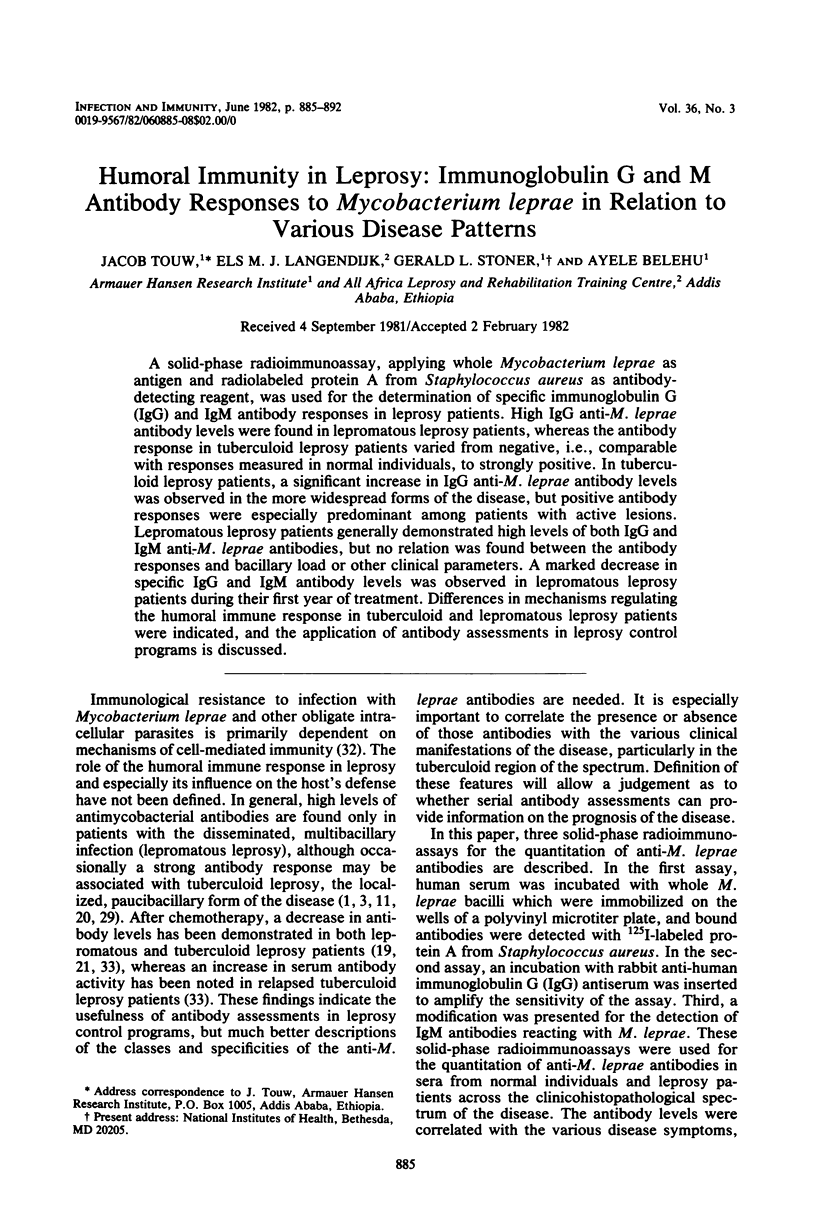
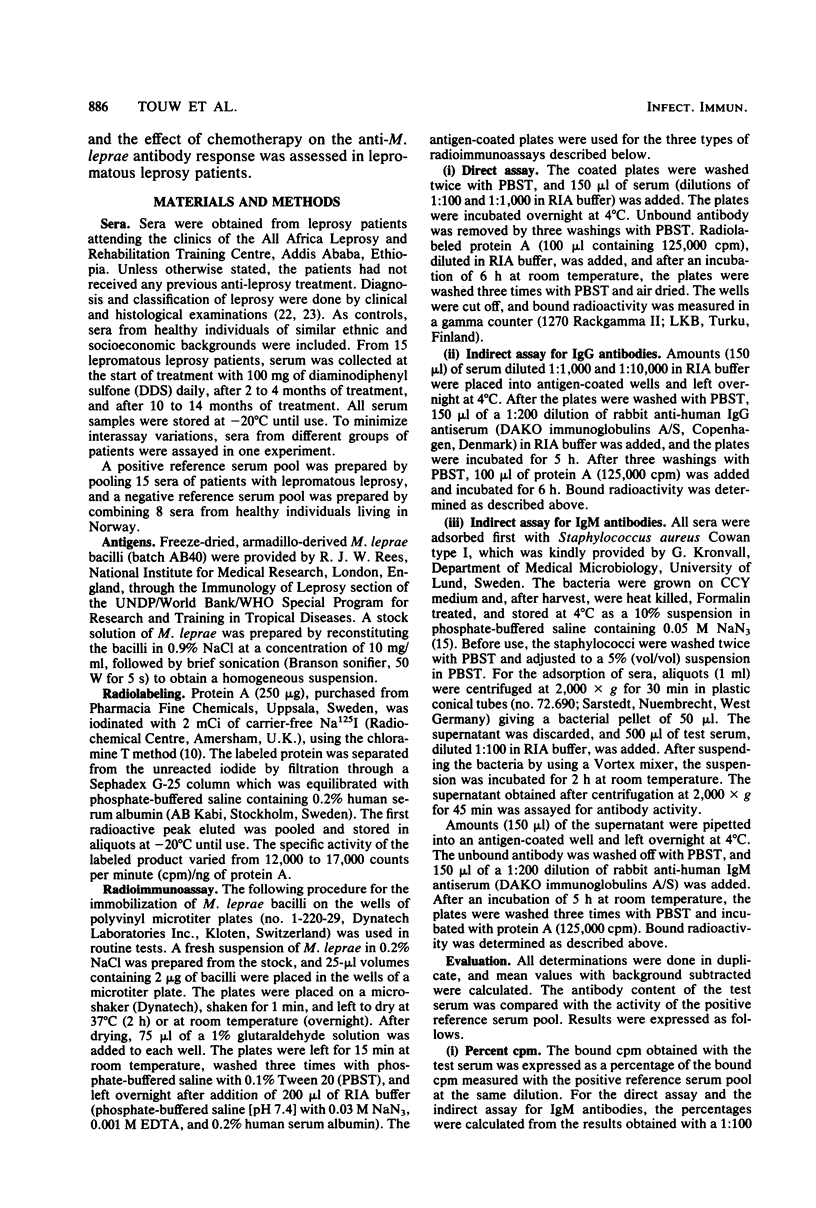
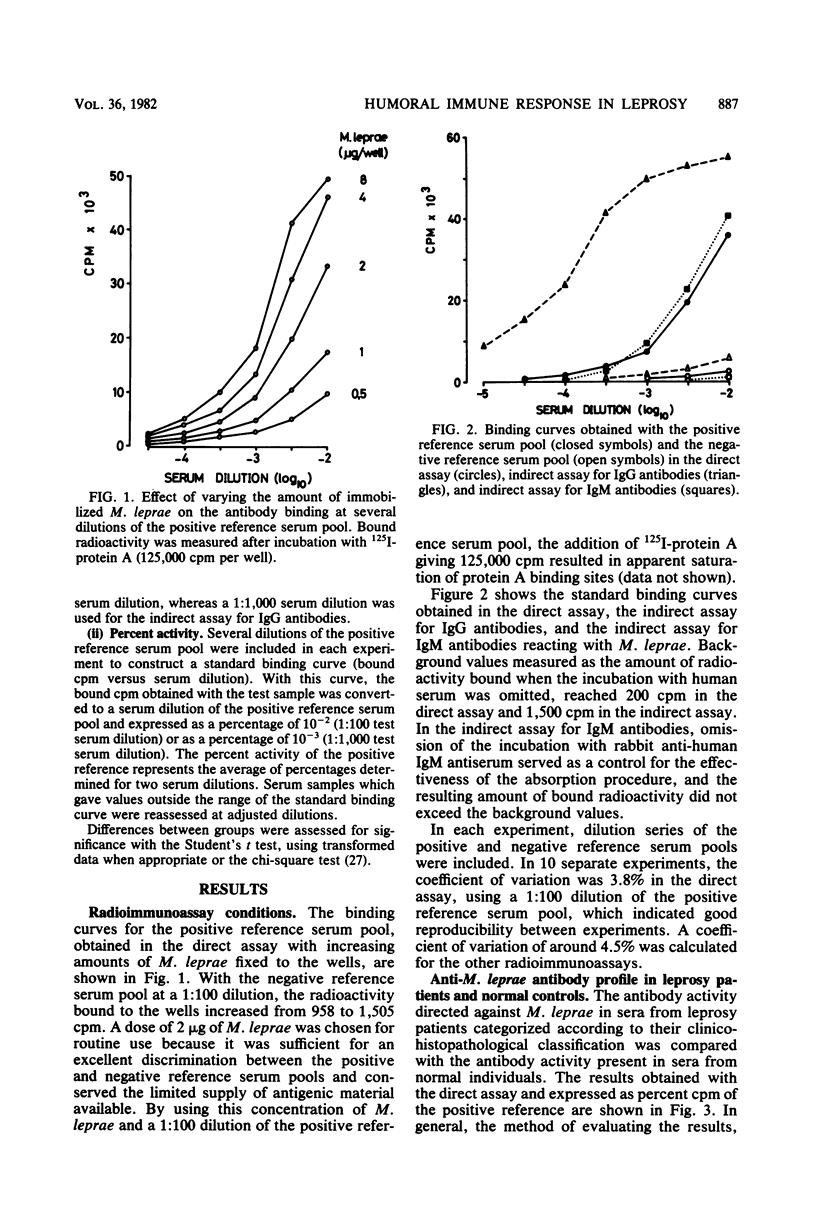
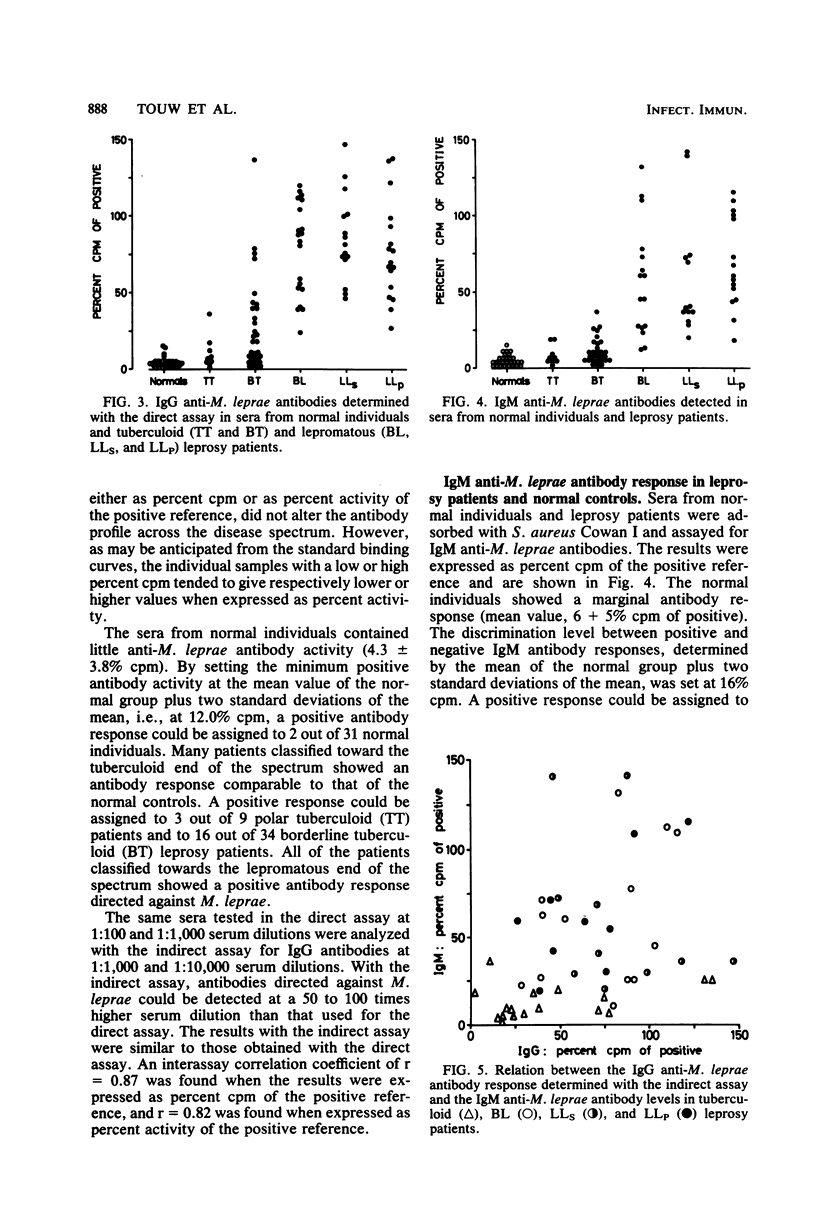
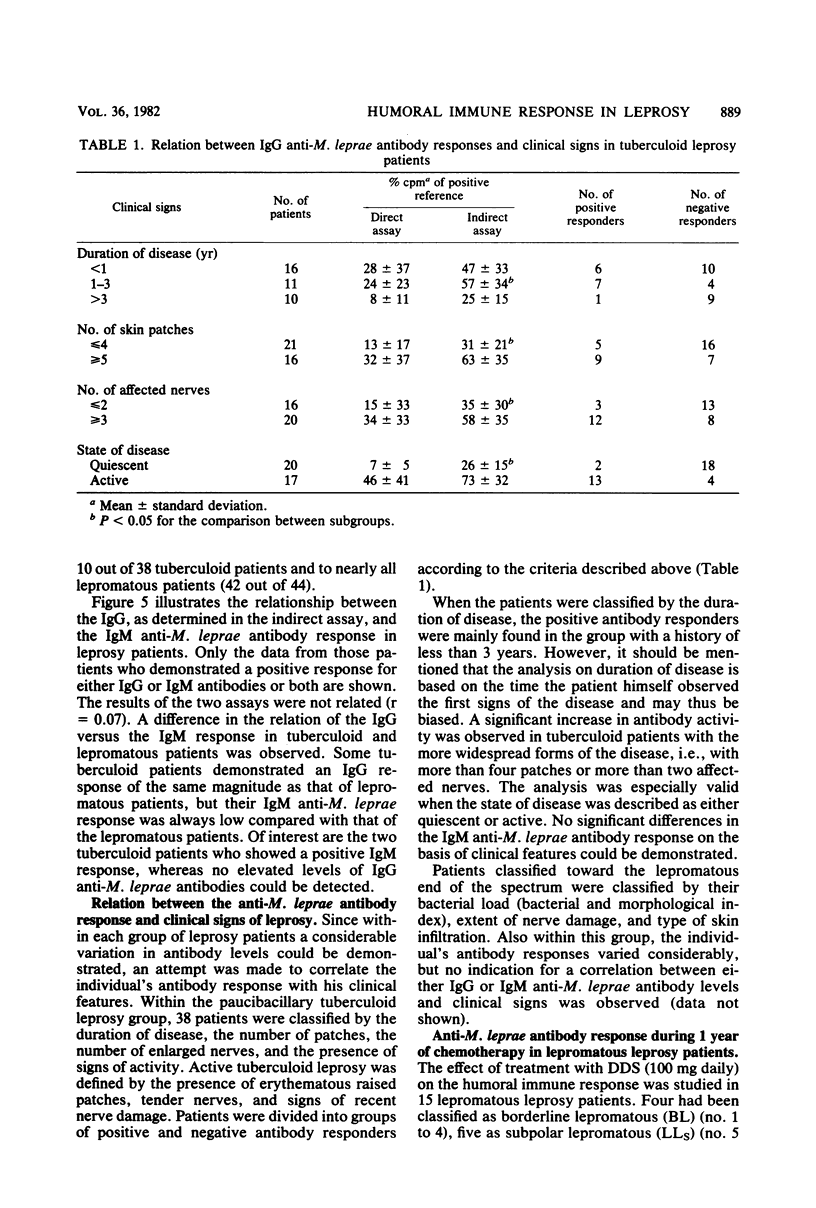
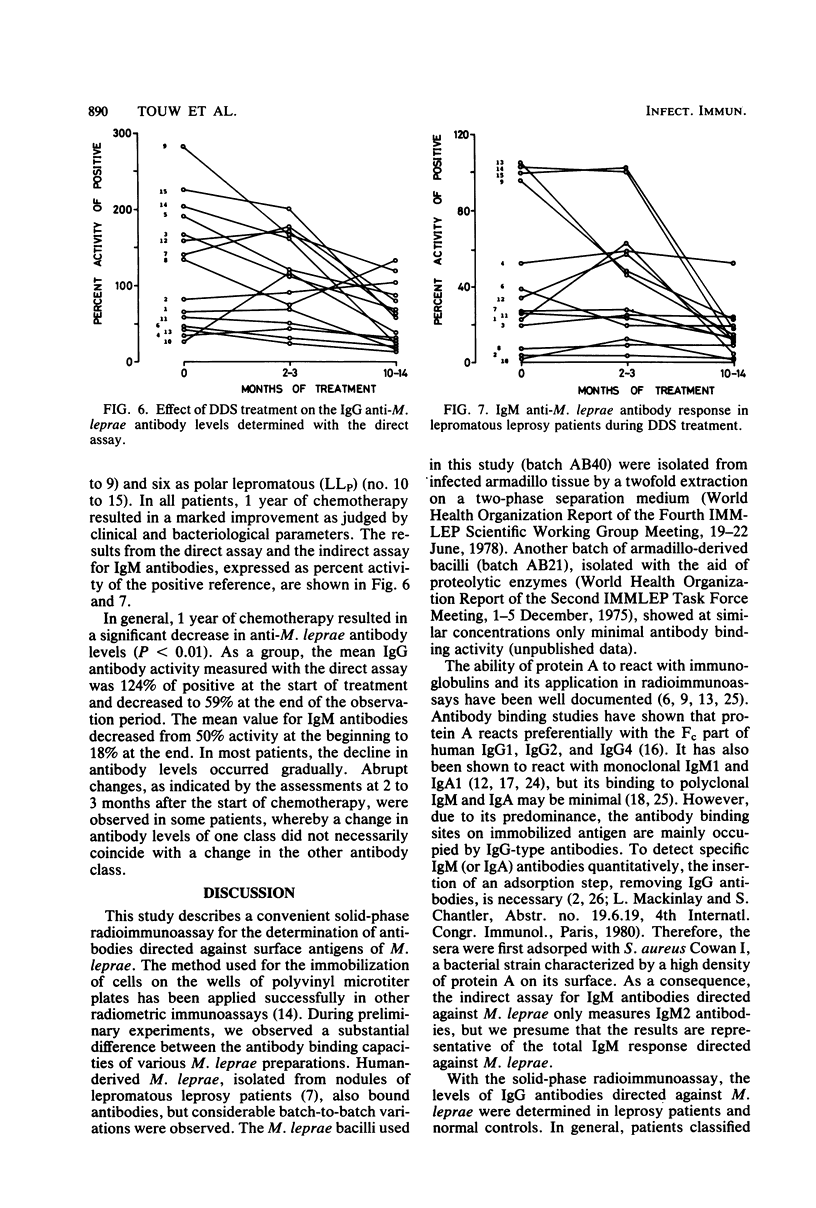
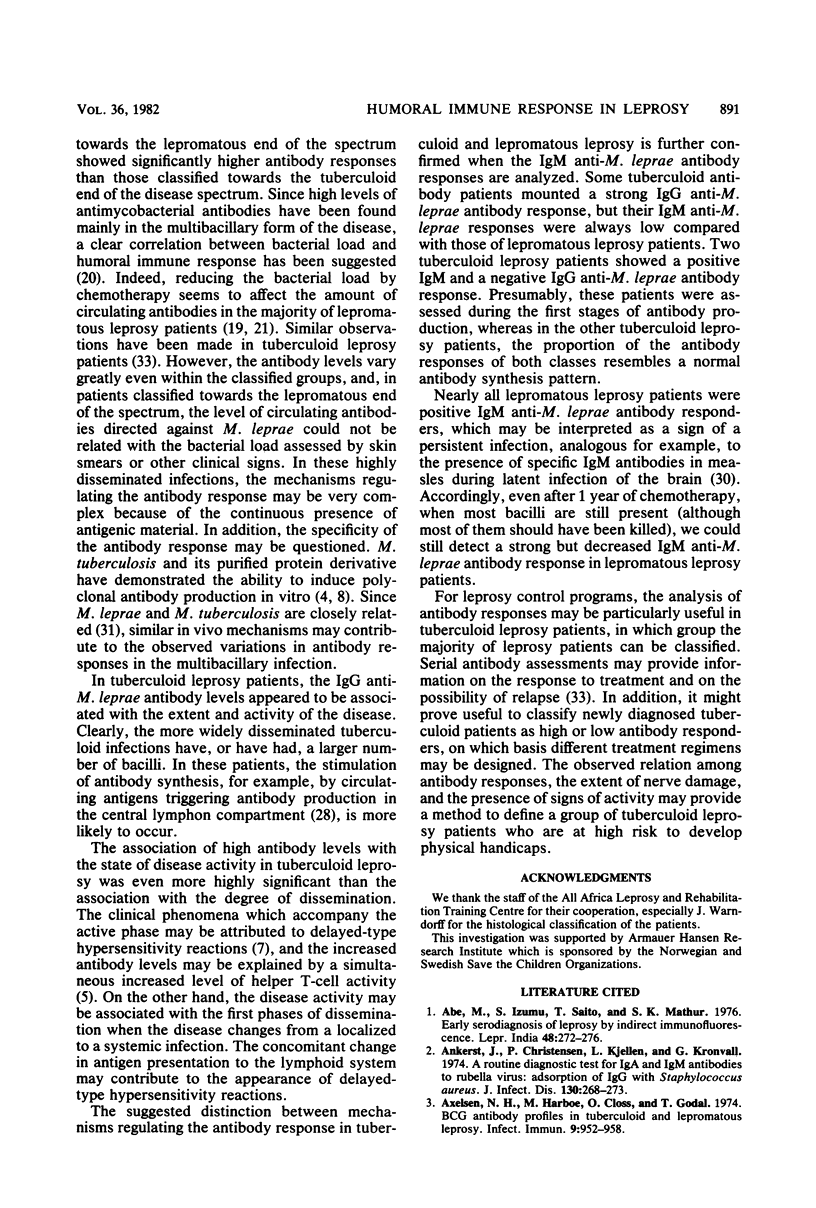
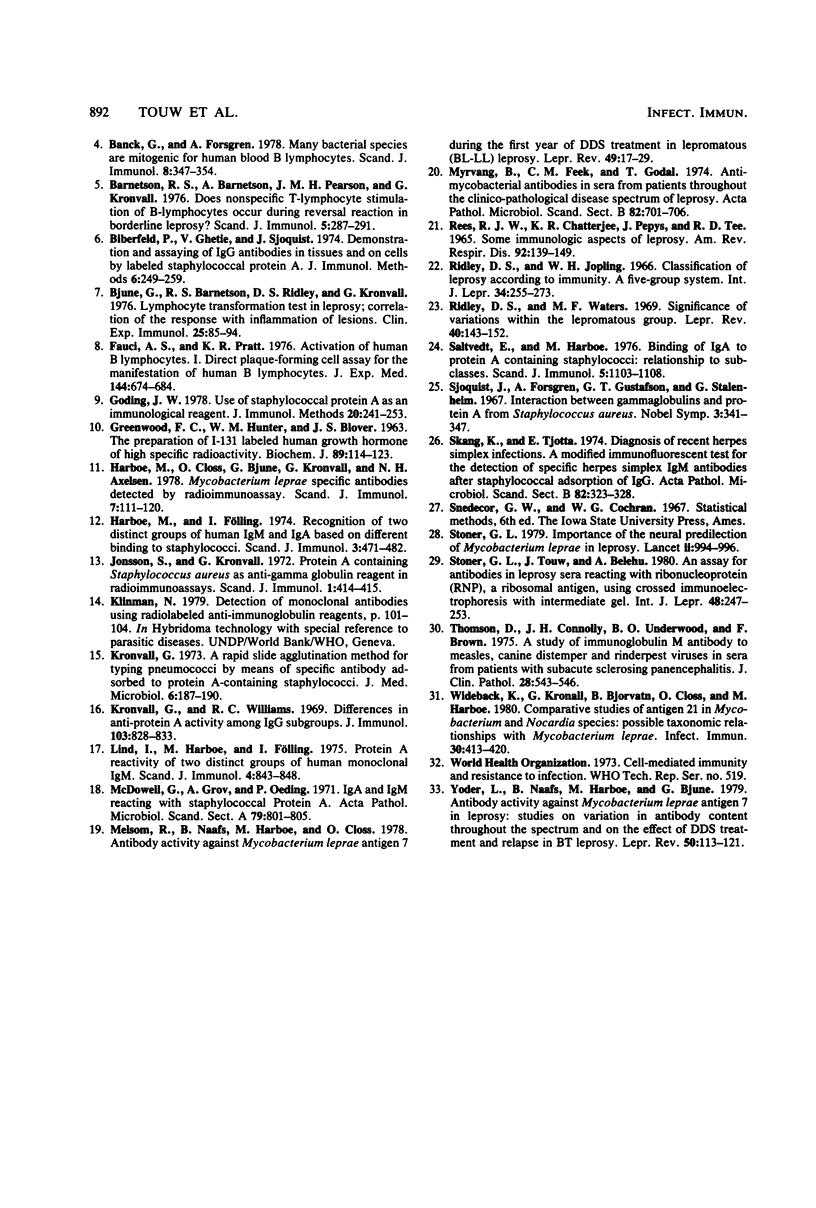
Selected References
These references are in PubMed. This may not be the complete list of references from this article.
- Abe M., Izumi S., Saito T., Mathur S. K. Early serodiagnosis of leprosy by indirect immunofluorescence. Lepr India. 1976 Jul;48(3):272–276. [PubMed] [Google Scholar]
- Ankerst J., Christensen P., Kjellén L., Kronvall G. A rountine diagnostic test for IgA and IgM antibodies to rubella virus: absorption of IgG with Staphylococcus aureus. J Infect Dis. 1974 Sep;130(3):268–273. doi: 10.1093/infdis/130.3.268. [DOI] [PubMed] [Google Scholar]
- Axelsen N. H., Harboe M., Closs O., Godal T. BCG antibody profiles in tuberculoid and lepromatous leprosy. Infect Immun. 1974 May;9(5):952–958. doi: 10.1128/iai.9.5.952-958.1974. [DOI] [PMC free article] [PubMed] [Google Scholar]
- Banck G., Forsgren A. Many bacterial species are mitogenic for human blood B lymphocytes. Scand J Immunol. 1978;8(4):347–354. doi: 10.1111/j.1365-3083.1978.tb00528.x. [DOI] [PubMed] [Google Scholar]
- Barnetson R., Barnetson A., Pearson J. M., Kronvall G. Does nonspecific T-lymphocyte stimulation of B lymphocytes occur during reversal reaction in borderline leprosy? Scand J Immunol. 1976;5(3):287–291. doi: 10.1111/j.1365-3083.1976.tb00280.x. [DOI] [PubMed] [Google Scholar]
- Biberfield P., Ghetie V., Sjöquist J. Demonstration and assaying of IgG antibodies in tissues and on cells by labeled staphylococcal protein A. J Immunol Methods. 1975 Jan;6(3):249–259. doi: 10.1016/0022-1759(75)90068-x. [DOI] [PubMed] [Google Scholar]
- Bjune G., Barnetson R. S., Ridley D. S., Kronvall G. Lymphocyte transformation test in leprosy; correlation of the response with inflammation of lesions. Clin Exp Immunol. 1976 Jul;25(1):85–94. [PMC free article] [PubMed] [Google Scholar]
- Fauci A. S., Pratt K. R. Activation of human B lymphocytes. I. Direct plaque-forming cell assay for the measurement of polyclonal activation and antigenic stimulation of human B lymphocytes. J Exp Med. 1976 Sep 1;144(3):674–684. doi: 10.1084/jem.144.3.674. [DOI] [PMC free article] [PubMed] [Google Scholar]
- GREENWOOD F. C., HUNTER W. M., GLOVER J. S. THE PREPARATION OF I-131-LABELLED HUMAN GROWTH HORMONE OF HIGH SPECIFIC RADIOACTIVITY. Biochem J. 1963 Oct;89:114–123. doi: 10.1042/bj0890114. [DOI] [PMC free article] [PubMed] [Google Scholar]
- Goding J. W. Use of staphylococcal protein A as an immunological reagent. J Immunol Methods. 1978;20:241–253. doi: 10.1016/0022-1759(78)90259-4. [DOI] [PubMed] [Google Scholar]
- Harboe M., Closs O., Bjune G., Kronvall G., Axelsen N. H. Mycobacterium leprae specific antibodies detected by radioimmunoassay. Scand J Immunol. 1978;7(2):111–120. doi: 10.1111/j.1365-3083.1978.tb00433.x. [DOI] [PubMed] [Google Scholar]
- Harboe M., Fölling I. Recognition of two distinct groups of human IgM and IgA based on different binding to staphylococci. Scand J Immunol. 1974;3(4):471–482. doi: 10.1111/j.1365-3083.1974.tb01280.x. [DOI] [PubMed] [Google Scholar]
- Kronvall G. A rapid slide-agglutination method for typing pneumococci by means of specific antibody adsorbed to protein A-containing staphylococci. J Med Microbiol. 1973 May;6(2):187–190. doi: 10.1099/00222615-6-2-187. [DOI] [PubMed] [Google Scholar]
- Kronvall G., Williams R. C., Jr Differences in anti-protein A activity among IgG subgroups. J Immunol. 1969 Oct;103(4):828–833. [PubMed] [Google Scholar]
- Lind I., Harboe M., Folling I. Protein A reactivity of two distinct groups of human monoclonal IgM. Scand J Immunol. 1975;4(8):843–848. doi: 10.1111/j.1365-3083.1975.tb03726.x. [DOI] [PubMed] [Google Scholar]
- McDowell G., Grov A., Oeding P. IgA and IgM reacting with staphylococcal protein A. Acta Pathol Microbiol Scand B Microbiol Immunol. 1971;79(6):801–804. doi: 10.1111/j.1699-0463.1971.tb00114.x. [DOI] [PubMed] [Google Scholar]
- Melsom R., Naafs B., Harboe M., Closs O. Antibody activity against Mycobacterium leprae antigen 7 during the first year of DDS treatment in lepromatous (BL-LL) leprosy. Lepr Rev. 1978 Mar;49(1):17–29. [PubMed] [Google Scholar]
- Myrvang B., Feek C. M., Godal T. Antimycobacterial antibodies in sera from patients throughout the clinico-pathological disease spectrum of leprosy. Acta Pathol Microbiol Scand B Microbiol Immunol. 1974 Oct;82B(5):701–706. doi: 10.1111/j.1699-0463.1974.tb00238.x. [DOI] [PubMed] [Google Scholar]
- Rees R. J., Chatterjee K. R., Pepys J., Tee R. D. Some immunologic aspects of leprosy. Am Rev Respir Dis. 1965 Dec;92(6):139–149. doi: 10.1164/arrd.1965.92.6P2.139. [DOI] [PubMed] [Google Scholar]
- Ridley D. S., Jopling W. H. Classification of leprosy according to immunity. A five-group system. Int J Lepr Other Mycobact Dis. 1966 Jul-Sep;34(3):255–273. [PubMed] [Google Scholar]
- Ridley D. S., Waters M. F. Significance of variations within the lepromatous group. Lepr Rev. 1969 Jul;40(3):143–152. doi: 10.5935/0305-7518.19690026. [DOI] [PubMed] [Google Scholar]
- Saltvedt E., Harboe M. Binding of IgA to protein-A-containing staphylococci: relationship to subclasses. Scand J Immunol. 1976;5(10):1103–1108. doi: 10.1111/j.1365-3083.1976.tb00250.x. [DOI] [PubMed] [Google Scholar]
- Skaug K., Tjotta E. Diagnosis of recent Herpes simplex infections. A modified immunofluorescent test for the detection of specific Herpes simplex IgM antibodies after staphylococcal adsorption of IgG. Acta Pathol Microbiol Scand B Microbiol Immunol. 1974 Jun;82(3):323–328. [PubMed] [Google Scholar]
- Stoner G. L. Importance of the neural predilection of Mycobacterium leprae in leprosy. Lancet. 1979 Nov 10;2(8150):994–996. doi: 10.1016/s0140-6736(79)92564-9. [DOI] [PubMed] [Google Scholar]
- Stoner G. L., Touw J., Belehu A. An assay for antibodies in leprosy sera reacting with ribonucleoprotein (RNP), a mycobacterial ribosomal antigen, using crossed immunoelectrophoresis with intermediate gel. Int J Lepr Other Mycobact Dis. 1980 Sep;48(3):247–253. [PubMed] [Google Scholar]
- Thomson D., Connolly J. H., Underwood B. O., Brown F. A study of immunoglobulin M antibody to measles, canine distemper, and rinderpest viruses in sera of patients with subacute sclerosing panencephalitis. J Clin Pathol. 1975 Jul;28(7):543–546. doi: 10.1136/jcp.28.7.543. [DOI] [PMC free article] [PubMed] [Google Scholar]
- Widebäck K., Kronvall G., Bjorvatn B., Closs O., Harboe M. Comparative studies of antigen 21 in Mycobacterium and Nocardia species: possible taxonomic relationships with Mycobacterium leprae. Infect Immun. 1980 Nov;30(2):413–420. doi: 10.1128/iai.30.2.413-420.1980. [DOI] [PMC free article] [PubMed] [Google Scholar]
- Yoder L., Naafs B., Harboe M., Bjune G. Antibody activity against Mycobacterium leprae antigen 7 in leprosy: studies on variation in antibody content throughout the spectrum and on the effect of DDS treatment and relapse in BT leprosy. Lepr Rev. 1979 Jun;50(2):113–121. doi: 10.5935/0305-7518.19790017. [DOI] [PubMed] [Google Scholar]


